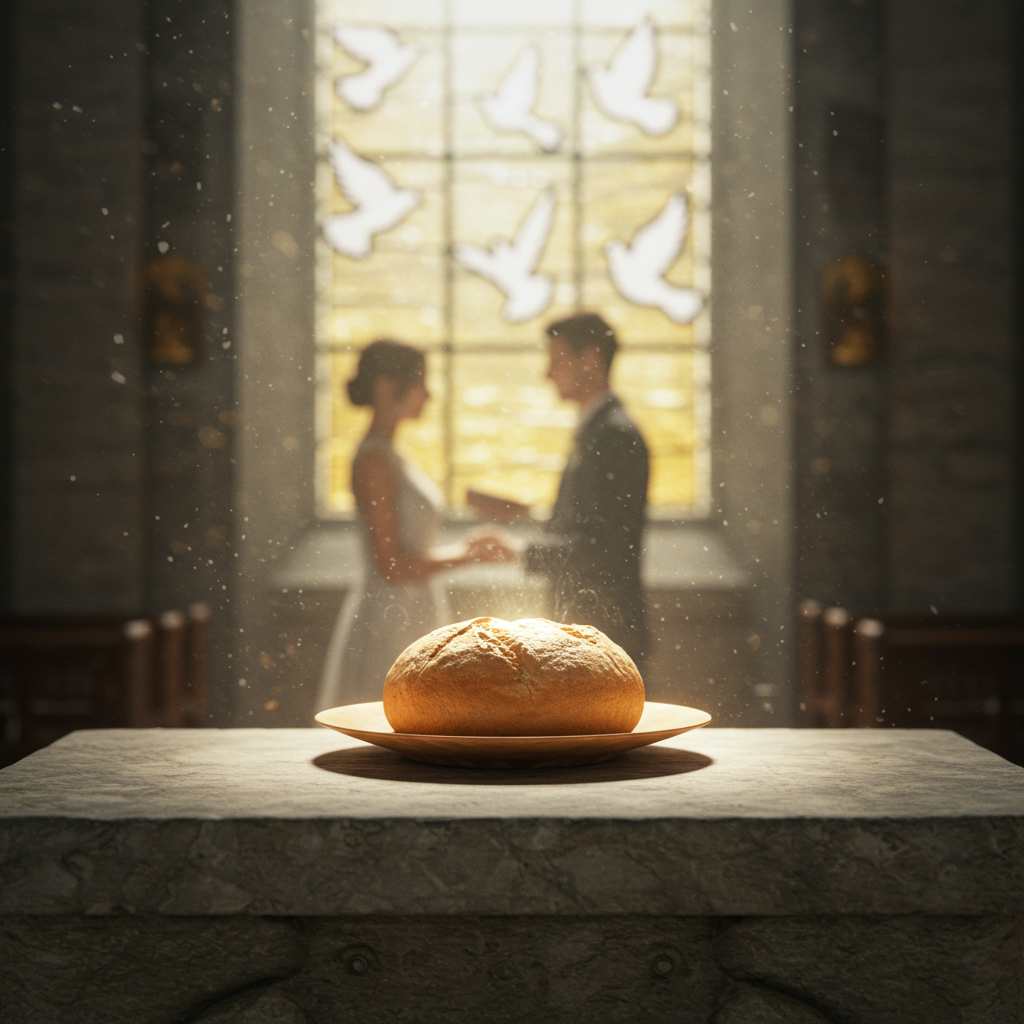The Altar
Charles Tennyson Turner
1808 to 1879

Want to track your favorites? Reopen or create a unique username. No personal details are required!
How fondly look'd I on the place,
Assign'd to rites of spousal love,
How saintly seem'd that board of grace,
With Jesus blessing bread above!
'Twas bosom'd in a kindlier air,
Than th' outer realms of care and dole;
A sacred spirit brooded there,
Whose spell-like silence lull'd the soul!
For tho' full oft the accents dear,
Here utter'd, had been falsely fond,
Still they were breath'd and plighted here,
And broken in a place beyond!
Charles Tennyson Turner's The Altar
Charles Tennyson Turner’s The Altar is a compact yet richly layered meditation on the tension between sacred idealism and human imperfection, framed through the lens of marital vows and their spiritual significance. Written during the Victorian era-a period marked by fervent religious devotion alongside growing existential doubt-the poem interrogates the fragility of human promises against the backdrop of divine permanence. By weaving sacramental imagery with intimate emotional reflection, Turner crafts a work that resonates with both personal vulnerability and universal existential inquiry.
Historical and Cultural Context
Turner’s dual identity as a Victorian clergyman and poet profoundly shapes the poem’s thematic concerns27. The altar, central to Christian rites of marriage and communion, symbolizes a space where earthly and divine realms intersect. In Victorian society, marriage was not merely a social contract but a sacrament, imbued with moral and spiritual gravity3. The poem’s focus on vows “falsely fond” reflects broader cultural anxieties about the erosion of religious fidelity in an age increasingly shaped by scientific rationalism and social upheaval. Turner’s own life-marked by his clerical duties and familial ties to Alfred Tennyson, whose works often grappled with faith and doubt-adds biographical depth to this tension36. The altar becomes a microcosm of Victorian spirituality: a sanctuary from the “outer realms of care and dole,” yet vulnerable to human failing.
Literary Devices and Symbolism
Turner employs vivid religious imagery to juxtapose the sacred and the profane. The “board of grace” (line 3) evokes both the communion table and the marital altar, merging Eucharistic symbolism with spousal union. This duality underscores the poem’s central paradox: the altar is a site of divine blessing (“Jesus blessing bread above”) and human frailty (“falsely fond” pledges). The “sacred spirit” (line 7) that broods over the space suggests a divine presence, yet its “spell-like silence” (line 8) hints at passivity-an observer rather than an enforcer of vows.
The poem’s structure reinforces its thematic contrasts. Though not a sonnet (Turner’s preferred form), its concise quatrains mirror the compression of complex emotions into a ritualized space. Enjambment between lines 9–10 (“accents dear / Here utter’d”) mimics the fluidity of spoken vows, while the abrupt caesura in “broken in a place beyond” (line 12) disrupts this flow, symbolizing the fracture between intention and action.
Themes: Sacramental Idealism vs. Human Frailty
At its core, The Altar explores the dissonance between the perfection of divine rites and the imperfection of those who enact them. The speaker’s initial reverence-“How fondly look’d I” (line 1)-gives way to melancholy recognition that vows, though “breath’d and plighted here” (line 11), are ultimately shattered elsewhere. This spatial distinction (“a place beyond”) invites multiple interpretations:
-
The Secular World: The “outer realms” (line 5) where societal pressures and human weakness corrupt sacred promises.
-
The Spiritual Realm: A metaphysical plane where broken vows echo eternally, underscoring their moral weight.
-
Psychological Space: The internal conflict between aspiration and failure, where idealism collides with reality.
Turner’s treatment of this theme aligns with Victorian preoccupations with moral accountability. Unlike his brother Alfred, whose In Memoriam confronts grief and cosmic doubt, Charles focuses on microcosmic failures-personal betrayals that ripple through the sacred36. The poem’s emotional impact lies in its quiet despair: the altar remains “saintly” (line 3), but its human participants falter, leaving the “sacred spirit” to brood over unresolved dissonance.
Comparative Analysis
Turner’s work invites comparison with contemporaneous poets who grappled with similar themes:
| Poet | Work | Thematic Parallel | Contrast |
|---|---|---|---|
| Christina Rossetti | A Birthday | Sacramental imagery celebrating divine love | Rossetti’s tone is jubilant; Turner’s is elegiac |
| Matthew Arnold | Dover Beach | Spiritual doubt in a changing world | Arnold’s scope is cosmic; Turner’s is intimate |
| Alfred Tennyson | The Princess | Critique of marital idealism | Alfred’s narrative sweep vs. Charles’s lyric focus |
Turner’s focus on the altar as both physical and metaphysical space also echoes Gerard Manley Hopkins’s sacramental vision, though without Hopkins’s ecstatic intensity9. Where Hopkins finds God in “dappled things,” Turner finds traces of the divine in human rituals-even flawed ones.
Philosophical and Emotional Resonance
The poem’s power derives from its unflinching honesty. The altar, “bosom’d in a kindlier air” (line 5), offers temporary refuge but cannot insulate against human failing. This reflects a distinctly Victorian existential tension: the desire for spiritual certainty in an increasingly uncertain world. Turner’s emotional restraint-eschewing melodrama for subdued reflection-amplifies the pathos. The broken vows are not condemned but mourned, suggesting a compassionate recognition of human limitation.
Philosophically, the poem engages with the Problem of Evil: if divine grace pervades sacred spaces, why does human frailty persist? Turner offers no resolution, leaving the “spell-like silence” (line 8) to hover as both comfort and indictment. This ambiguity resonates with modern readers, for whom the tension between idealism and reality remains urgent.
Conclusion
The Altar stands as a testament to Charles Tennyson Turner’s nuanced understanding of faith and human imperfection. By situating intimate marital vows within a sacramental framework, he elevates personal failure to a metaphysical plane, inviting reflection on the endurance of sacred ideals in a fallible world. The poem’s enduring relevance lies in its ability to harmonize reverence and critique-a delicate balance that secures Turner’s place among Victorian literature’s most thoughtful observers of the human condition.
This text was generated by AI and is for reference only. Learn more

